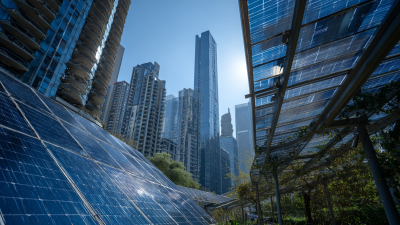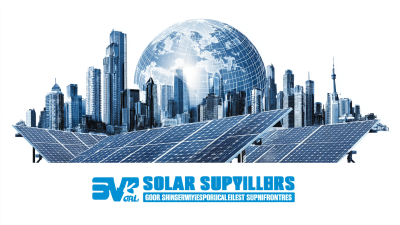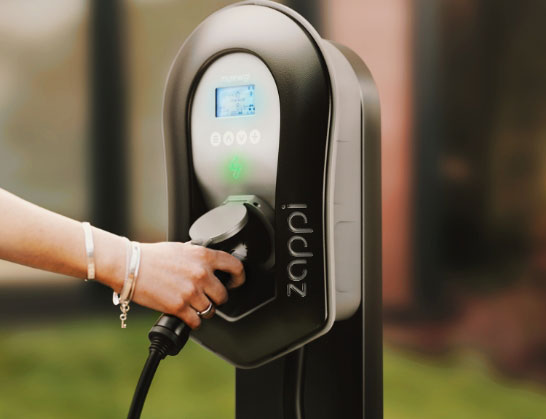Maximize Your Home Energy Efficiency with Cutting Edge Solar Panels
As the world increasingly shifts toward sustainable energy solutions, homeowners are turning to innovative technologies to maximize their energy efficiency. One of the most impactful advancements in this endeavor is the installation of solar panels for houses, which not only reduce carbon footprints but also lower electricity bills significantly. According to the National Renewable Energy Laboratory (NREL), residential solar panel systems can save homeowners an average of $20,000 over 20 years, making them a financially sound investment.

Furthermore, a recent report from the Solar Energy Industries Association (SEIA) indicates that solar energy accounted for 43% of all new electricity generation capacity added in the U.S. in 2020. This surge in adoption is driven by enhanced technology and government incentives, which have made solar panels more accessible and efficient than ever before. By harnessing cutting-edge solar technology, homeowners can optimize their energy usage, leading to substantial long-term savings and a smaller environmental impact.
Understanding Solar Panel Technology: An Overview of Innovations
The global market for portable and foldable solar panels is experiencing significant growth, with a projected size of $940 million in 2024. This market is expected to expand substantially, reaching $2.15 billion by 2033, reflecting a robust compound annual growth rate (CAGR) of 9.6%. This surge indicates a growing trend toward energy efficiency and sustainability in various sectors, as consumers and businesses alike look for innovative solutions in renewable energy.
In addition to portable solar solutions, the CIGS (Copper Indium Gallium Selenide) and CIS (Copper Indium Selenide) solar cell modules are poised for notable advancement. The market for these modules was valued at $320 million in 2022 and is anticipated to grow to $780 million by 2030, translating to an impressive CAGR of 11.8% from 2024 to 2030. This growth reflects the ongoing innovations in solar technology that enhance efficiency and adaptability, making solar energy a more viable option for consumers and industries seeking to reduce their carbon footprint and optimize energy consumption.
Top Benefits of Upgrading to the Latest Solar Panels for Homeowners
Upgrading to the latest solar panels offers homeowners a multitude of benefits that enhance both energy efficiency and long-term savings. Modern solar technology boasts higher efficiency rates, allowing more sunlight to be converted into usable electricity. This means that even on cloudy days, homeowners can still generate sufficient energy to meet their household needs. Additionally, advanced solar panels are designed to be more durable and weather-resistant, reducing the need for frequent replacements and maintenance.
Another significant advantage of the newest solar panels is their ability to integrate with smart home systems. This connectivity allows homeowners to monitor energy production and consumption in real-time, optimizing usage patterns for both cost savings and energy sustainability. Moreover, many states offer incentives and tax credits for installing these innovative solar systems, making the initial investment more accessible. By upgrading, homeowners not only contribute to environmental conservation but also significantly enhance their property’s value and energy independence.
Maximize Your Home Energy Efficiency with Cutting Edge Solar Panels
This bar chart illustrates the potential energy savings for homeowners when upgrading to the latest solar panel technology. The data represents the average savings in energy costs over five years based on different solar panel efficiencies.
Evaluating Energy Efficiency: How Solar Panels Reduce Your Carbon Footprint
The shift towards solar panels in residential energy solutions not only enhances energy efficiency but also plays a crucial role in reducing carbon footprints. By harnessing the power of the sun, homeowners can significantly decrease their reliance on fossil fuels. This transition means using a clean, renewable energy source, which dramatically cuts down greenhouse gas emissions typically associated with conventional energy sources. As households adopt solar technology, each individual's contribution to a cleaner environment amplifies, fostering a collective impact that is both immediate and long-lasting.

Moreover, the integration of cutting-edge solar panels into home energy systems can lead to substantial financial savings over time. As these panels generate electricity from sunlight, homeowners can lower their energy bills, and in many cases, even eliminate them altogether. This financial benefit, coupled with the positive environmental implications, highlights the dual advantage of investing in solar technology. Evaluating energy efficiency through the lens of solar energy reveals a pathway not only to economical living but also to a sustainable future, encouraging more households to consider solar upgrades as a viable option for reducing their carbon footprint.
Cost Analysis: Investing in Cutting-Edge Solar Panels for Long-Term Savings
Investing in cutting-edge solar panels can significantly affect your long-term savings and energy costs. According to the National Renewable Energy Laboratory (NREL), solar energy systems can reduce electricity bills by up to 70% over their lifetime, which typically ranges from 25 to 30 years. The upfront costs of advanced solar technologies may be higher initially, but the financial benefits far outweigh these expenses when viewed through the lens of long-term savings. For instance, the levelized cost of electricity (LCOE) for solar has fallen by nearly 90% since 2009, making solar power increasingly competitive with traditional energy sources.

Furthermore, various studies highlight the financial incentives associated with solar panel installations. The solar Investment Tax Credit (ITC) allows homeowners to deduct 26% of the installation costs from their federal taxes, providing immediate savings that can further enhance the return on investment (ROI). Additionally, a report from the Lawrence Berkeley National Laboratory indicates that homes with solar panels sell for about 4.1% more than comparable homes without them. This premium can offset installation costs and reinforces the value of investing in this sustainable energy solution. With these compelling financial metrics, it's clear that cutting-edge solar panels represent a smart investment for homeowners aiming to maximize energy efficiency and minimize utility expenses.
Future Trends: The Next Generation of Solar Panels and Their Impact on Energy Efficiency
The solar panel market is on the brink of transformation, particularly with the rise of next-generation technologies such as perovskite solar cells. This innovative approach is projected to grow from $101.02 million in 2025 to over $1.25 billion by 2032, reflecting a remarkable compound annual growth rate of 43.34%. Such advancements not only signify increased efficiency but also promise more affordable residential solar solutions. As these solar technologies continue to develop, they will play a pivotal role in maximizing energy efficiency in homes.
Tips: When considering solar panel installation, evaluate the latest technology options available, like perovskite cells or advanced cadmium telluride modules showcased at industry expos. These newer options often provide better efficiency and durability compared to traditional panels, making them a wise investment for the future.
Moreover, emerging trends indicate a future where solar technology synergizes with other innovations, enhancing energy management. Homeowners should stay informed about advancements in solar technology to take advantage of improved efficiencies and potential savings in energy costs. Integrating such solutions can significantly impact overall energy consumption and sustainability efforts.
Maximize Your Home Energy Efficiency with Cutting Edge Solar Panels - Future Trends: The Next Generation of Solar Panels and Their Impact on Energy Efficiency
| Feature | Traditional Panels | Next Generation Panels | Impact on Efficiency (%) |
|---|---|---|---|
| Conversion Efficiency | 15-20% | 22-30% | Up to 50% increase |
| Lifespan | 25 years | 30-40 years | 25% more durable |
| Energy Production per Sq. Ft. | 150-200W | 300-400W | 100% more production |
| Cost per Watt | $3.00 | $2.50 | 17% cheaper |
| Environmental Impact | Medium | Low | 25% less carbon footprint |
Related Posts
-

The Ultimate Guide to Optimizing Solar Power Installation for Global Buyers
-

The Future of Best Pv Panels in 2025 A Comprehensive Guide to Emerging Technologies and Market Trends
-

Ultimate Guide to Maximizing Home Solar Power System Efficiency with Proven Industry Insights
-

Unlocking Sustainable Energy Solutions by Choosing the Best Solar Panel Suppliers for Global Procurement
-

Global Reach: Elevating Solar Energy Standards with China's Best Solar Power Solutions
-

12 Top Rated Solar Pv Panels for Global Buyers in 2023


